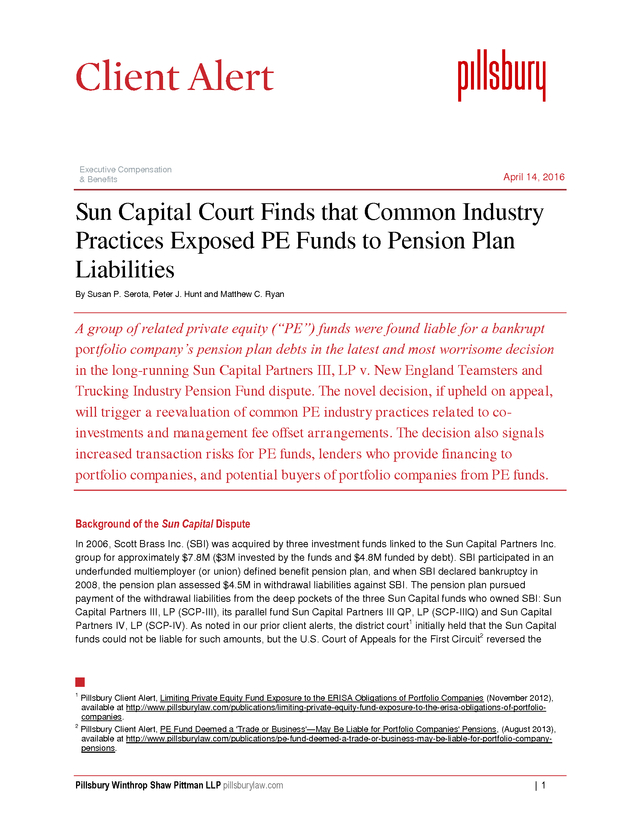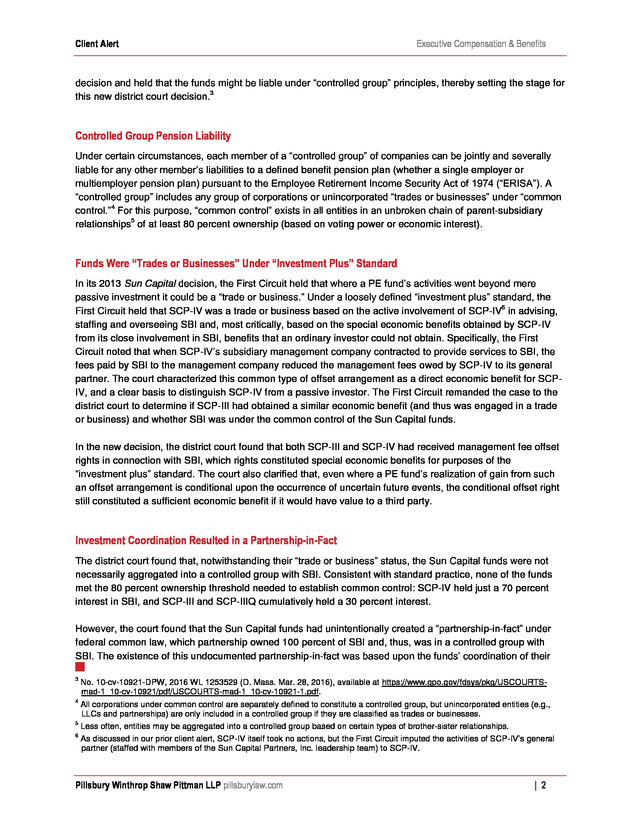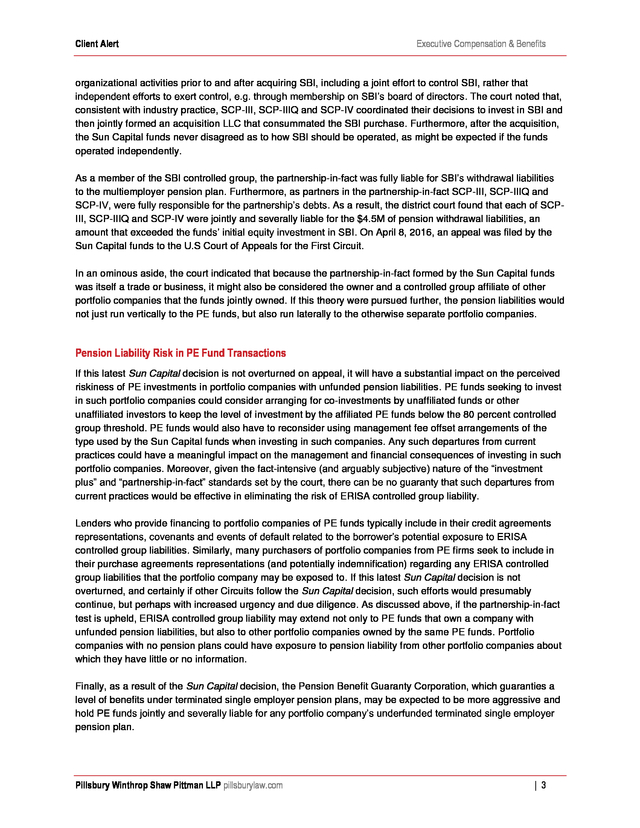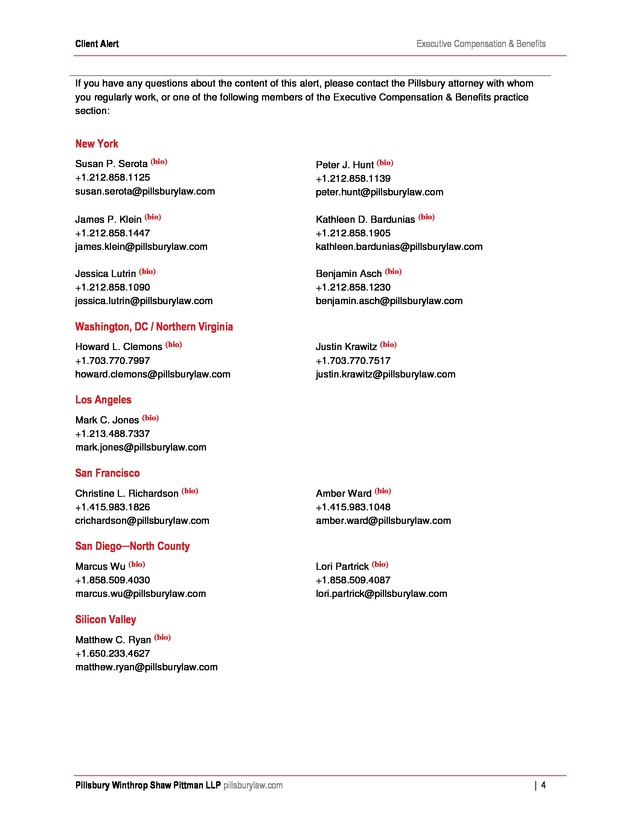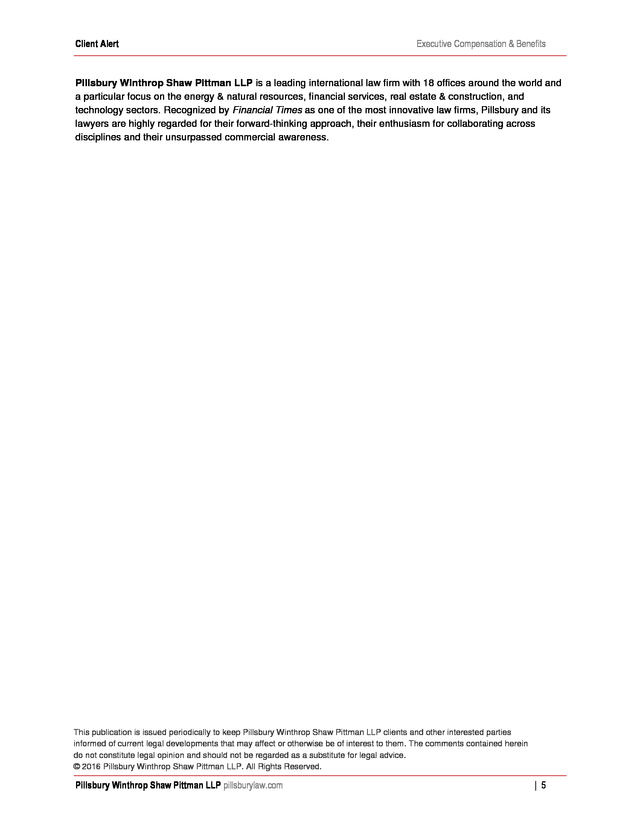Sun Capital Court Finds that Common Industry Practices Exposed PE Funds to Pension Plan Liabilities – April 14, 2016
Pillsbury Winthrop Shaw Pittman
Description
Client Alert
Executive Compensation
& Benefits
Executive Compensation & Benefits
April 14, 2016
Sun Capital Court Finds that Common Industry
Practices Exposed PE Funds to Pension Plan
Liabilities
By Susan P. Serota, Peter J. Hunt and Matthew C. Ryan
A group of related private equity (“PE”) funds were found liable for a bankrupt
portfolio company’s pension plan debts in the latest and most worrisome decision
in the long-running Sun Capital Partners III, LP v.
New England Teamsters and Trucking Industry Pension Fund dispute. The novel decision, if upheld on appeal, will trigger a reevaluation of common PE industry practices related to coinvestments and management fee offset arrangements. The decision also signals increased transaction risks for PE funds, lenders who provide financing to portfolio companies, and potential buyers of portfolio companies from PE funds. Background of the Sun Capital Dispute In 2006, Scott Brass Inc.
(SBI) was acquired by three investment funds linked to the Sun Capital Partners Inc. group for approximately $7.8M ($3M invested by the funds and $4.8M funded by debt). SBI participated in an underfunded multiemployer (or union) defined benefit pension plan, and when SBI declared bankruptcy in 2008, the pension plan assessed $4.5M in withdrawal liabilities against SBI. The pension plan pursued payment of the withdrawal liabilities from the deep pockets of the three Sun Capital funds who owned SBI: Sun Capital Partners III, LP (SCP-III), its parallel fund Sun Capital Partners III QP, LP (SCP-IIIQ) and Sun Capital Partners IV, LP (SCP-IV).
As noted in our prior client alerts, the district court1 initially held that the Sun Capital funds could not be liable for such amounts, but the U.S. Court of Appeals for the First Circuit2 reversed the ï§ 1 Pillsbury Client Alert, Limiting Private Equity Fund Exposure to the ERISA Obligations of Portfolio Companies (November 2012), available at http://www.pillsburylaw.com/publications/limiting-private-equity-fund-exposure-to-the-erisa-obligations-of-portfoliocompanies. 2 Pillsbury Client Alert, PE Fund Deemed a 'Trade or Business'—May Be Liable for Portfolio Companies' Pensions, (August 2013), available at http://www.pillsburylaw.com/publications/pe-fund-deemed-a-trade-or-business-may-be-liable-for-portfolio-companypensions. Pillsbury Winthrop Shaw Pittman LLP pillsburylaw.com | 1 . Client Alert Executive Compensation & Benefits decision and held that the funds might be liable under “controlled group” principles, thereby setting the stage for this new district court decision.3 Controlled Group Pension Liability Under certain circumstances, each member of a “controlled group” of companies can be jointly and severally liable for any other member’s liabilities to a defined benefit pension plan (whether a single employer or multiemployer pension plan) pursuant to the Employee Retirement Income Security Act of 1974 (“ERISA”). A “controlled group” includes any group of corporations or unincorporated “trades or businesses” under “common control.”4 For this purpose, “common control” exists in all entities in an unbroken chain of parent-subsidiary relationships5 of at least 80 percent ownership (based on voting power or economic interest). Funds Were “Trades or Businesses” Under “Investment Plus” Standard In its 2013 Sun Capital decision, the First Circuit held that where a PE fund’s activities went beyond mere passive investment it could be a “trade or business.” Under a loosely defined “investment plus” standard, the First Circuit held that SCP-IV was a trade or business based on the active involvement of SCP-IV6 in advising, staffing and overseeing SBI and, most critically, based on the special economic benefits obtained by SCP-IV from its close involvement in SBI, benefits that an ordinary investor could not obtain. Specifically, the First Circuit noted that when SCP-IV’s subsidiary management company contracted to provide services to SBI, the fees paid by SBI to the management company reduced the management fees owed by SCP-IV to its general partner. The court characterized this common type of offset arrangement as a direct economic benefit for SCPIV, and a clear basis to distinguish SCP-IV from a passive investor.
The First Circuit remanded the case to the district court to determine if SCP-III had obtained a similar economic benefit (and thus was engaged in a trade or business) and whether SBI was under the common control of the Sun Capital funds. In the new decision, the district court found that both SCP-III and SCP-IV had received management fee offset rights in connection with SBI, which rights constituted special economic benefits for purposes of the “investment plus” standard. The court also clarified that, even where a PE fund’s realization of gain from such an offset arrangement is conditional upon the occurrence of uncertain future events, the conditional offset right still constituted a sufficient economic benefit if it would have value to a third party. Investment Coordination Resulted in a Partnership-in-Fact The district court found that, notwithstanding their “trade or business” status, the Sun Capital funds were not necessarily aggregated into a controlled group with SBI. Consistent with standard practice, none of the funds met the 80 percent ownership threshold needed to establish common control: SCP-IV held just a 70 percent interest in SBI, and SCP-III and SCP-IIIQ cumulatively held a 30 percent interest. However, the court found that the Sun Capital funds had unintentionally created a “partnership-in-fact” under federal common law, which partnership owned 100 percent of SBI and, thus, was in a controlled group with SBI.
The existence of this undocumented partnership-in-fact was based upon the funds’ coordination of their ï§ 3 No. 10-cv-10921-DPW, 2016 WL 1253529 (D. Mass.
Mar. 28, 2016), available at https://www.gpo.gov/fdsys/pkg/USCOURTSmad-1_10-cv-10921/pdf/USCOURTS-mad-1_10-cv-10921-1.pdf. 4 All corporations under common control are separately defined to constitute a controlled group, but unincorporated entities (e.g., LLCs and partnerships) are only included in a controlled group if they are classified as trades or businesses. 5 Less often, entities may be aggregated into a controlled group based on certain types of brother-sister relationships. 6 As discussed in our prior client alert, SCP-IV itself took no actions, but the First Circuit imputed the activities of SCP-IV’s general partner (staffed with members of the Sun Capital Partners, Inc. leadership team) to SCP-IV. Pillsbury Winthrop Shaw Pittman LLP pillsburylaw.com | 2 .
Client Alert Executive Compensation & Benefits organizational activities prior to and after acquiring SBI, including a joint effort to control SBI, rather that independent efforts to exert control, e.g. through membership on SBI’s board of directors. The court noted that, consistent with industry practice, SCP-III, SCP-IIIQ and SCP-IV coordinated their decisions to invest in SBI and then jointly formed an acquisition LLC that consummated the SBI purchase. Furthermore, after the acquisition, the Sun Capital funds never disagreed as to how SBI should be operated, as might be expected if the funds operated independently. As a member of the SBI controlled group, the partnership-in-fact was fully liable for SBI’s withdrawal liabilities to the multiemployer pension plan.
Furthermore, as partners in the partnership-in-fact SCP-III, SCP-IIIQ and SCP-IV, were fully responsible for the partnership’s debts. As a result, the district court found that each of SCPIII, SCP-IIIQ and SCP-IV were jointly and severally liable for the $4.5M of pension withdrawal liabilities, an amount that exceeded the funds’ initial equity investment in SBI. On April 8, 2016, an appeal was filed by the Sun Capital funds to the U.S Court of Appeals for the First Circuit. In an ominous aside, the court indicated that because the partnership-in-fact formed by the Sun Capital funds was itself a trade or business, it might also be considered the owner and a controlled group affiliate of other portfolio companies that the funds jointly owned.
If this theory were pursued further, the pension liabilities would not just run vertically to the PE funds, but also run laterally to the otherwise separate portfolio companies. Pension Liability Risk in PE Fund Transactions If this latest Sun Capital decision is not overturned on appeal, it will have a substantial impact on the perceived riskiness of PE investments in portfolio companies with unfunded pension liabilities. PE funds seeking to invest in such portfolio companies could consider arranging for co-investments by unaffiliated funds or other unaffiliated investors to keep the level of investment by the affiliated PE funds below the 80 percent controlled group threshold. PE funds would also have to reconsider using management fee offset arrangements of the type used by the Sun Capital funds when investing in such companies.
Any such departures from current practices could have a meaningful impact on the management and financial consequences of investing in such portfolio companies. Moreover, given the fact-intensive (and arguably subjective) nature of the “investment plus” and “partnership-in-fact” standards set by the court, there can be no guaranty that such departures from current practices would be effective in eliminating the risk of ERISA controlled group liability. Lenders who provide financing to portfolio companies of PE funds typically include in their credit agreements representations, covenants and events of default related to the borrower’s potential exposure to ERISA controlled group liabilities. Similarly, many purchasers of portfolio companies from PE firms seek to include in their purchase agreements representations (and potentially indemnification) regarding any ERISA controlled group liabilities that the portfolio company may be exposed to.
If this latest Sun Capital decision is not overturned, and certainly if other Circuits follow the Sun Capital decision, such efforts would presumably continue, but perhaps with increased urgency and due diligence. As discussed above, if the partnership-in-fact test is upheld, ERISA controlled group liability may extend not only to PE funds that own a company with unfunded pension liabilities, but also to other portfolio companies owned by the same PE funds. Portfolio companies with no pension plans could have exposure to pension liability from other portfolio companies about which they have little or no information. Finally, as a result of the Sun Capital decision, the Pension Benefit Guaranty Corporation, which guaranties a level of benefits under terminated single employer pension plans, may be expected to be more aggressive and hold PE funds jointly and severally liable for any portfolio company’s underfunded terminated single employer pension plan. Pillsbury Winthrop Shaw Pittman LLP pillsburylaw.com | 3 .
Client Alert Executive Compensation & Benefits If you have any questions about the content of this alert, please contact the Pillsbury attorney with whom you regularly work, or one of the following members of the Executive Compensation & Benefits practice section: New York Susan P. Serota (bio) +1.212.858.1125 susan.serota@pillsburylaw.com Peter J. Hunt (bio) +1.212.858.1139 peter.hunt@pillsburylaw.com James P. Klein (bio) +1.212.858.1447 james.klein@pillsburylaw.com Kathleen D.
Bardunias (bio) +1.212.858.1905 kathleen.bardunias@pillsburylaw.com Jessica Lutrin (bio) +1.212.858.1090 jessica.lutrin@pillsburylaw.com Benjamin Asch (bio) +1.212.858.1230 benjamin.asch@pillsburylaw.com Washington, DC / Northern Virginia Howard L. Clemons (bio) +1.703.770.7997 howard.clemons@pillsburylaw.com Justin Krawitz (bio) +1.703.770.7517 justin.krawitz@pillsburylaw.com Los Angeles Mark C. Jones (bio) +1.213.488.7337 mark.jones@pillsburylaw.com San Francisco Christine L.
Richardson (bio) +1.415.983.1826 crichardson@pillsburylaw.com Amber Ward (bio) +1.415.983.1048 amber.ward@pillsburylaw.com San Diego─North County Marcus Wu (bio) +1.858.509.4030 marcus.wu@pillsburylaw.com Lori Partrick (bio) +1.858.509.4087 lori.partrick@pillsburylaw.com Silicon Valley Matthew C. Ryan (bio) +1.650.233.4627 matthew.ryan@pillsburylaw.com Pillsbury Winthrop Shaw Pittman LLP pillsburylaw.com | 4 . Client Alert Executive Compensation & Benefits Pillsbury Winthrop Shaw Pittman LLP is a leading international law firm with 18 offices around the world and a particular focus on the energy & natural resources, financial services, real estate & construction, and technology sectors. Recognized by Financial Times as one of the most innovative law firms, Pillsbury and its lawyers are highly regarded for their forward-thinking approach, their enthusiasm for collaborating across disciplines and their unsurpassed commercial awareness. This publication is issued periodically to keep Pillsbury Winthrop Shaw Pittman LLP clients and other interested parties informed of current legal developments that may affect or otherwise be of interest to them. The comments contained herein do not constitute legal opinion and should not be regarded as a substitute for legal advice. © 2016 Pillsbury Winthrop Shaw Pittman LLP. All Rights Reserved. Pillsbury Winthrop Shaw Pittman LLP pillsburylaw.com | 5 .
.
New England Teamsters and Trucking Industry Pension Fund dispute. The novel decision, if upheld on appeal, will trigger a reevaluation of common PE industry practices related to coinvestments and management fee offset arrangements. The decision also signals increased transaction risks for PE funds, lenders who provide financing to portfolio companies, and potential buyers of portfolio companies from PE funds. Background of the Sun Capital Dispute In 2006, Scott Brass Inc.
(SBI) was acquired by three investment funds linked to the Sun Capital Partners Inc. group for approximately $7.8M ($3M invested by the funds and $4.8M funded by debt). SBI participated in an underfunded multiemployer (or union) defined benefit pension plan, and when SBI declared bankruptcy in 2008, the pension plan assessed $4.5M in withdrawal liabilities against SBI. The pension plan pursued payment of the withdrawal liabilities from the deep pockets of the three Sun Capital funds who owned SBI: Sun Capital Partners III, LP (SCP-III), its parallel fund Sun Capital Partners III QP, LP (SCP-IIIQ) and Sun Capital Partners IV, LP (SCP-IV).
As noted in our prior client alerts, the district court1 initially held that the Sun Capital funds could not be liable for such amounts, but the U.S. Court of Appeals for the First Circuit2 reversed the ï§ 1 Pillsbury Client Alert, Limiting Private Equity Fund Exposure to the ERISA Obligations of Portfolio Companies (November 2012), available at http://www.pillsburylaw.com/publications/limiting-private-equity-fund-exposure-to-the-erisa-obligations-of-portfoliocompanies. 2 Pillsbury Client Alert, PE Fund Deemed a 'Trade or Business'—May Be Liable for Portfolio Companies' Pensions, (August 2013), available at http://www.pillsburylaw.com/publications/pe-fund-deemed-a-trade-or-business-may-be-liable-for-portfolio-companypensions. Pillsbury Winthrop Shaw Pittman LLP pillsburylaw.com | 1 . Client Alert Executive Compensation & Benefits decision and held that the funds might be liable under “controlled group” principles, thereby setting the stage for this new district court decision.3 Controlled Group Pension Liability Under certain circumstances, each member of a “controlled group” of companies can be jointly and severally liable for any other member’s liabilities to a defined benefit pension plan (whether a single employer or multiemployer pension plan) pursuant to the Employee Retirement Income Security Act of 1974 (“ERISA”). A “controlled group” includes any group of corporations or unincorporated “trades or businesses” under “common control.”4 For this purpose, “common control” exists in all entities in an unbroken chain of parent-subsidiary relationships5 of at least 80 percent ownership (based on voting power or economic interest). Funds Were “Trades or Businesses” Under “Investment Plus” Standard In its 2013 Sun Capital decision, the First Circuit held that where a PE fund’s activities went beyond mere passive investment it could be a “trade or business.” Under a loosely defined “investment plus” standard, the First Circuit held that SCP-IV was a trade or business based on the active involvement of SCP-IV6 in advising, staffing and overseeing SBI and, most critically, based on the special economic benefits obtained by SCP-IV from its close involvement in SBI, benefits that an ordinary investor could not obtain. Specifically, the First Circuit noted that when SCP-IV’s subsidiary management company contracted to provide services to SBI, the fees paid by SBI to the management company reduced the management fees owed by SCP-IV to its general partner. The court characterized this common type of offset arrangement as a direct economic benefit for SCPIV, and a clear basis to distinguish SCP-IV from a passive investor.
The First Circuit remanded the case to the district court to determine if SCP-III had obtained a similar economic benefit (and thus was engaged in a trade or business) and whether SBI was under the common control of the Sun Capital funds. In the new decision, the district court found that both SCP-III and SCP-IV had received management fee offset rights in connection with SBI, which rights constituted special economic benefits for purposes of the “investment plus” standard. The court also clarified that, even where a PE fund’s realization of gain from such an offset arrangement is conditional upon the occurrence of uncertain future events, the conditional offset right still constituted a sufficient economic benefit if it would have value to a third party. Investment Coordination Resulted in a Partnership-in-Fact The district court found that, notwithstanding their “trade or business” status, the Sun Capital funds were not necessarily aggregated into a controlled group with SBI. Consistent with standard practice, none of the funds met the 80 percent ownership threshold needed to establish common control: SCP-IV held just a 70 percent interest in SBI, and SCP-III and SCP-IIIQ cumulatively held a 30 percent interest. However, the court found that the Sun Capital funds had unintentionally created a “partnership-in-fact” under federal common law, which partnership owned 100 percent of SBI and, thus, was in a controlled group with SBI.
The existence of this undocumented partnership-in-fact was based upon the funds’ coordination of their ï§ 3 No. 10-cv-10921-DPW, 2016 WL 1253529 (D. Mass.
Mar. 28, 2016), available at https://www.gpo.gov/fdsys/pkg/USCOURTSmad-1_10-cv-10921/pdf/USCOURTS-mad-1_10-cv-10921-1.pdf. 4 All corporations under common control are separately defined to constitute a controlled group, but unincorporated entities (e.g., LLCs and partnerships) are only included in a controlled group if they are classified as trades or businesses. 5 Less often, entities may be aggregated into a controlled group based on certain types of brother-sister relationships. 6 As discussed in our prior client alert, SCP-IV itself took no actions, but the First Circuit imputed the activities of SCP-IV’s general partner (staffed with members of the Sun Capital Partners, Inc. leadership team) to SCP-IV. Pillsbury Winthrop Shaw Pittman LLP pillsburylaw.com | 2 .
Client Alert Executive Compensation & Benefits organizational activities prior to and after acquiring SBI, including a joint effort to control SBI, rather that independent efforts to exert control, e.g. through membership on SBI’s board of directors. The court noted that, consistent with industry practice, SCP-III, SCP-IIIQ and SCP-IV coordinated their decisions to invest in SBI and then jointly formed an acquisition LLC that consummated the SBI purchase. Furthermore, after the acquisition, the Sun Capital funds never disagreed as to how SBI should be operated, as might be expected if the funds operated independently. As a member of the SBI controlled group, the partnership-in-fact was fully liable for SBI’s withdrawal liabilities to the multiemployer pension plan.
Furthermore, as partners in the partnership-in-fact SCP-III, SCP-IIIQ and SCP-IV, were fully responsible for the partnership’s debts. As a result, the district court found that each of SCPIII, SCP-IIIQ and SCP-IV were jointly and severally liable for the $4.5M of pension withdrawal liabilities, an amount that exceeded the funds’ initial equity investment in SBI. On April 8, 2016, an appeal was filed by the Sun Capital funds to the U.S Court of Appeals for the First Circuit. In an ominous aside, the court indicated that because the partnership-in-fact formed by the Sun Capital funds was itself a trade or business, it might also be considered the owner and a controlled group affiliate of other portfolio companies that the funds jointly owned.
If this theory were pursued further, the pension liabilities would not just run vertically to the PE funds, but also run laterally to the otherwise separate portfolio companies. Pension Liability Risk in PE Fund Transactions If this latest Sun Capital decision is not overturned on appeal, it will have a substantial impact on the perceived riskiness of PE investments in portfolio companies with unfunded pension liabilities. PE funds seeking to invest in such portfolio companies could consider arranging for co-investments by unaffiliated funds or other unaffiliated investors to keep the level of investment by the affiliated PE funds below the 80 percent controlled group threshold. PE funds would also have to reconsider using management fee offset arrangements of the type used by the Sun Capital funds when investing in such companies.
Any such departures from current practices could have a meaningful impact on the management and financial consequences of investing in such portfolio companies. Moreover, given the fact-intensive (and arguably subjective) nature of the “investment plus” and “partnership-in-fact” standards set by the court, there can be no guaranty that such departures from current practices would be effective in eliminating the risk of ERISA controlled group liability. Lenders who provide financing to portfolio companies of PE funds typically include in their credit agreements representations, covenants and events of default related to the borrower’s potential exposure to ERISA controlled group liabilities. Similarly, many purchasers of portfolio companies from PE firms seek to include in their purchase agreements representations (and potentially indemnification) regarding any ERISA controlled group liabilities that the portfolio company may be exposed to.
If this latest Sun Capital decision is not overturned, and certainly if other Circuits follow the Sun Capital decision, such efforts would presumably continue, but perhaps with increased urgency and due diligence. As discussed above, if the partnership-in-fact test is upheld, ERISA controlled group liability may extend not only to PE funds that own a company with unfunded pension liabilities, but also to other portfolio companies owned by the same PE funds. Portfolio companies with no pension plans could have exposure to pension liability from other portfolio companies about which they have little or no information. Finally, as a result of the Sun Capital decision, the Pension Benefit Guaranty Corporation, which guaranties a level of benefits under terminated single employer pension plans, may be expected to be more aggressive and hold PE funds jointly and severally liable for any portfolio company’s underfunded terminated single employer pension plan. Pillsbury Winthrop Shaw Pittman LLP pillsburylaw.com | 3 .
Client Alert Executive Compensation & Benefits If you have any questions about the content of this alert, please contact the Pillsbury attorney with whom you regularly work, or one of the following members of the Executive Compensation & Benefits practice section: New York Susan P. Serota (bio) +1.212.858.1125 susan.serota@pillsburylaw.com Peter J. Hunt (bio) +1.212.858.1139 peter.hunt@pillsburylaw.com James P. Klein (bio) +1.212.858.1447 james.klein@pillsburylaw.com Kathleen D.
Bardunias (bio) +1.212.858.1905 kathleen.bardunias@pillsburylaw.com Jessica Lutrin (bio) +1.212.858.1090 jessica.lutrin@pillsburylaw.com Benjamin Asch (bio) +1.212.858.1230 benjamin.asch@pillsburylaw.com Washington, DC / Northern Virginia Howard L. Clemons (bio) +1.703.770.7997 howard.clemons@pillsburylaw.com Justin Krawitz (bio) +1.703.770.7517 justin.krawitz@pillsburylaw.com Los Angeles Mark C. Jones (bio) +1.213.488.7337 mark.jones@pillsburylaw.com San Francisco Christine L.
Richardson (bio) +1.415.983.1826 crichardson@pillsburylaw.com Amber Ward (bio) +1.415.983.1048 amber.ward@pillsburylaw.com San Diego─North County Marcus Wu (bio) +1.858.509.4030 marcus.wu@pillsburylaw.com Lori Partrick (bio) +1.858.509.4087 lori.partrick@pillsburylaw.com Silicon Valley Matthew C. Ryan (bio) +1.650.233.4627 matthew.ryan@pillsburylaw.com Pillsbury Winthrop Shaw Pittman LLP pillsburylaw.com | 4 . Client Alert Executive Compensation & Benefits Pillsbury Winthrop Shaw Pittman LLP is a leading international law firm with 18 offices around the world and a particular focus on the energy & natural resources, financial services, real estate & construction, and technology sectors. Recognized by Financial Times as one of the most innovative law firms, Pillsbury and its lawyers are highly regarded for their forward-thinking approach, their enthusiasm for collaborating across disciplines and their unsurpassed commercial awareness. This publication is issued periodically to keep Pillsbury Winthrop Shaw Pittman LLP clients and other interested parties informed of current legal developments that may affect or otherwise be of interest to them. The comments contained herein do not constitute legal opinion and should not be regarded as a substitute for legal advice. © 2016 Pillsbury Winthrop Shaw Pittman LLP. All Rights Reserved. Pillsbury Winthrop Shaw Pittman LLP pillsburylaw.com | 5 .
.



